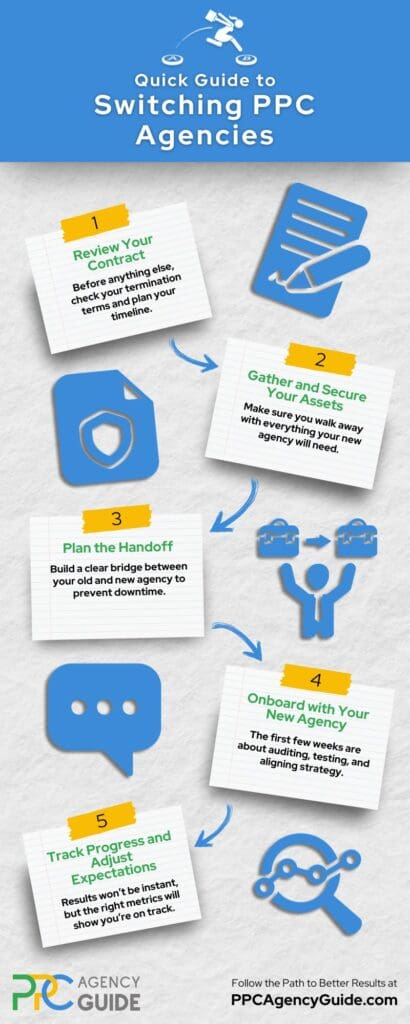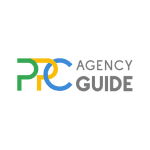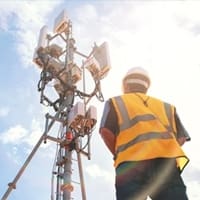
Many of the business owners we connect with aren’t new to pay-per-click (PPC) advertising. Oftentimes, they’ve tried running campaigns on their own, then worked with some type of PPC pro, such as a freelancer, consultant, or agency, and still didn’t get the results they were hoping for. If that sounds familiar, take heart. Paid advertising does work. In fact, a typical business generates twice what it invests in Google Ads, according to the platform. However, you do need to have someone who truly understands the ad networks, your business, and your customers to achieve strong results, which can sometimes mean changing things up. In this guide, we’ll cover PPC agency red flags, how to switch PPC agencies smoothly, and what to expect during a PPC agency transition process, so you can move forward with confidence.
Signs It’s Time to Change Your PPC Agency
Sometimes, the hardest part about making a PPC agency switch is knowing whether it’s actually time. You may not be getting the results you hoped for, but how do you tell if it’s truly a performance issue or just part of the process?
If you’re second-guessing your current partnership, trust your instincts, but verify them with data. Below are some common signs it’s time to replace your current PPC agency and move in a new direction.
You’re Not Seeing Progress and You’re Not Getting Answers
A temporary plateau might not be cause for concern, especially if your agency is actively testing and refining your campaigns. But if performance has been flat or declining for weeks or months, and you’re not getting a clear explanation, it’s a red flag.
- PPC Performance Issues: Begin by measuring PPC agency performance. Things like weak conversion rates, rising cost per click (CPC), or inconsistent traffic can all point to problems with how your campaigns are being managed.
- Lack of Transparency Around Results: If you’re not sure how to identify performance issues with your PPC agency, that’s part of the issue. A good partner should walk you through key trends, explain what they mean, and outline the next steps.
- No Clear Path Forward: When questions about results are met with vague responses or silence, it may be time to explore a PPC agency switch.
Communication is Inconsistent or Unclear
One of the most important PPC agency expectations is transparency. That means your agency is providing numbers and offering insight into what they mean and what’s being done about them. If you’re constantly chasing updates or feel like you’re always in the dark, it may be time to rethink the relationship.
Your Campaigns Feel Generic
Every business is different. If your agency is recycling the same ad strategies across accounts without tailoring them to your goals or audience, your campaigns won’t perform to their full potential.
You’re Doing More Than You Should
Agencies are supposed to take work off your plate. If you’re writing ad copy or digging through reports to figure out what’s going wrong, something’s off. Replacing your PPC agency could give you back the time and clarity you need.
Steps for Seamless PPC Agency Handovers
With the right steps in place, you can avoid performance drops, protect your data, and make the transition feel almost effortless.
Check Your Contract
Most PPC agency contracts include a termination clause. This outlines the conditions under which you can end your agreement without penalty and the steps you need to take in order to leave.
It’s common for agencies to require 30 days’ notice or more when ending an agreement. Some may even tie you into quarterly or annual agreements. However, even if these rules exist, you may still be able to leave without penalty if they’ve violated any service level agreements (SLAs).
Once you know when you can leave and the conditions that are required to end the agreement, you can determine the ideal timeline for switching.
Start Preparing Before You Make the Switch
The handover process PPC transitions require starts long before your current agency steps away. Organizing access, gathering assets, and clarifying ownership now will help your new agency move quickly and effectively.

- Start by Gathering Campaign Data Before Switching: Export performance reports, keyword lists, ad creative, targeting settings, and conversion configurations. This historical data will give your new team critical context.
- Make Ownership Clear: Confirm who owns your Google Ads accounts, analytics platforms, landing page builders, and tag managers. If your previous agency created them, you may need to request transfers.
- Back Up Everything: From budget history to audience settings, storing a full campaign archive ensures you’re not left guessing about past performance.
Confirm Access and Control
One of the most common blockers in a PPC handover process is a lack of admin access. Without full control of your accounts, transitioning PPC campaigns can be complicated and time-consuming.
- Check Permissions Early: Make sure your business has admin-level access to all tools and platforms tied to your advertising efforts.
- Simplify PPC Data Transfer: Establish which platforms your new agency will need to access and make sure credentials are correct and working.
Create a Clear Timeline and Communication Plan
To ensure a smooth PPC transition, map out key dates and responsibilities on both sides. This reduces confusion and avoids duplicated efforts.
- Coordinate Your Agency Handover PPC Timeline: If your outgoing agency will be active during the transition, outline what they’ll handle and what the new agency is expected to take on.
- Support Your PPC Agency Transition with Context: Provide your new agency with a handoff document that covers goals, recent test results, and current campaign performance. This can significantly reduce the learning curve.
Set Internal Expectations for the First Few Weeks
Changing ad agencies will always bring a short adjustment period. Even if the new team is highly experienced, they’ll need time to audit, optimize, and align strategies.
- Don’t Rush Campaign Overhauls: Give your new partner time to evaluate what’s working and what isn’t before making sweeping changes.
- Help Your Team Understand the Value of a Stable Transition: When internal stakeholders understand what to expect, it’s easier to stay focused on long-term outcomes.
Common Challenges in PPC Agency Transitions
Even the smoothest transitions may hit bumps. Knowing what to watch out for can help you avoid bigger problems later. Below, we’ll explore the most common issues businesses face when changing PPC agencies and what you can do to stay ahead of them.
Account Access and Ownership Conflicts
- Loss of Platform Control: If the agency owns your Google Ads or Google Analytics accounts, you may lose access when the partnership ends.
- Unclear Admin Permissions: Many businesses assume they have full access, only to find they’re locked out of key tools during the transition.
- Delayed Transfers: Without clear agreements, ownership disputes can stall the handoff and delay new campaign activity.
How to Resolve Ownership Disputes During PPC Transitions
If your previous agency resists transferring access, refer to your original agreement. Contracts often specify who owns what, and those terms can be enforced. If needed, reach out to the ad platform directly, such as through Google Ads support, to request assistance with recovering or transferring access.
Avoiding Downtime Between Agencies
- Gaps in Campaign Oversight: When one team steps out before the next is fully onboarded, ads may be left unmonitored or paused.
- Timing Conflicts: If your transition overlaps with seasonal peaks or budget resets, even minor disruptions can have outsized impacts.
- Lack of Pre-Planning: When the new agency doesn’t have materials or account access lined up, delays are almost guaranteed.
Communication and Coordination Gaps
- Untracked Hand-Offs: Without a checklist or point person, it’s easy to lose track of what’s been transferred and what’s outstanding.
- Assumed Responsibilities: Teams may make incorrect assumptions about who is handling what during the transition.
- Missed Context: Details like recent tests, strategy shifts, or audience exclusions can get lost unless intentionally shared.
What to Expect from Your New PPC Agency
Once your new partner steps in, the focus shifts to getting your campaigns back on track or building something better. A strong agency won’t dive in blindly. Instead, they’ll walk you through a structured process, clarify priorities, and ensure your campaigns align with your business goals. Let’s explore what that looks like.
Expect a Structured Onboarding
The onboarding process with a new PPC agency involves reviewing what’s in place and developing a plan that reflects your actual objectives. Even if your campaigns are already active, your new agency will likely treat the engagement as a fresh start internally.
- Initial Account Audit: Your agency will review existing campaigns, past performance, and account structure to identify issues and opportunities.
- Goal Alignment Session: Expect a conversation that connects your business objectives with campaign strategy before changes are made.
- Timeline Walkthrough: A quality team will give you the full timeline and outline their PPC onboarding steps, so you know what’s happening and when.
Understand the Setup Process
After onboarding, the agency will begin implementation. This phase includes reviewing infrastructure, organizing accounts, and preparing to launch or optimize campaigns.
- Platform and Tracking Verification: Your agency will confirm access, tracking setup, and pixel placement before launching anything new.
- Structural Review: This includes evaluating how your campaigns are organized and making recommendations for a new PPC campaign setup as needed.
- Reporting Setup: Dashboards and performance benchmarks are typically established during the new PPC agency setup phase.
Know What You’ll Receive
Before getting into optimizations or testing, your agency should set expectations about deliverables, reporting, and communication. This ensures you’re not left wondering whether progress is being made.
- Defined Reporting Cadence: You should receive regular updates that match your preferences, such as monthly or biweekly reporting.
- Customized Deliverables: Deliverables from a new PPC agency might include creative, testing plans, strategy briefs, or budget pacing updates.
- Clear Onboarding Plan: The onboarding process with a new PPC agency should explain what to expect and how progress will be communicated.
Set Expectations Around Timing
Even with a solid strategy, it takes time to implement changes and see meaningful results. Your agency should give you a sense of what to expect in the early weeks and how performance will be evaluated over time.
- Short-Term Testing Window: It’s common for agencies to spend the first few weeks testing and refining campaigns before scaling spend.
- Realistic Performance Benchmarks: Understanding the transition timeline for PPC campaigns helps set expectations for traction and improvement.
- Communication Milestones: Expect regular updates throughout the PPC onboarding process to keep you informed.
Setting Realistic Goals After Switching PPC Agencies
One of the biggest mistakes businesses make after switching agencies is expecting instant results. While some improvements may happen quickly, real progress takes time, especially if major structural changes are being made. Setting realistic goals helps you stay focused, track what matters, and evaluate performance fairly.

Know What to Watch Early On
In the first few weeks, the focus is usually on auditing, gathering insights, and implementing foundational changes. You might see improvements in click-through rates or ad relevance, but consistent lead quality or return on ad spend will take longer to stabilize.
- Short-Term Indicators: Engagement metrics like impressions, CTR, and bounce rate can show early signs of improvement, even if conversions lag behind.
- Baseline Establishment: Your agency may need to collect new data to create accurate benchmarks for future comparison.
- Initial Testing Period: During this time, many agencies experiment with messaging, targeting, or offers to find what resonates.
Focus on the Right Metrics
It’s easy to get caught up in vanity metrics, but your performance goals should tie directly to business outcomes. Your agency should help you understand what to monitor and why.
- Campaign Performance Metrics: These include cost per lead, quality scores, and conversion rates, which are all key indicators of efficiency and effectiveness.
- PPC Success Tracking: Beyond leads or sales, this may involve monitoring how well traffic engages with your site, whether visitors are completing micro-conversions, or how budget shifts affect outcomes.
- PPC Metrics Tracking: Make sure reporting aligns with your business priorities. A beautiful dashboard means nothing if it’s not measuring what matters.
Adjust Expectations During the Transition
Every agency has its own style of reporting, but good ones will align with your business objectives and communicate clearly. That starts with focusing on the metrics that matter.
- Data That Tells a Story: PPC metrics tracking should highlight meaningful trends rather than week-to-week fluctuations. Your agency should help you understand how the data connects to real outcomes.
- Clarity Over Complexity: Too many reports lead to confusion. You should know which numbers reflect progress and which are simply noise.
Adjust Expectations as the New Strategy Takes Hold
Results take time, especially if your account needs cleanup or if you’re trying a new channel, like Microsoft Ads or Performance Max. Even top-performing agencies don’t deliver overnight transformations.
Your reports may look different than what you’re used to, particularly if you’re switching ad management platforms or providers. That’s normal.
If you’re not sure how to interpret the numbers, ask your agency to walk you through it. They should be tracking metrics after switching PPC agencies and proactively highlighting both wins and areas of concern.
Get Help Switching PPC Agencies
If you’re ready to make a PPC agency change, we can help. Our expansive network of vetted agencies specialize in a variety of industries, from retail to technology, and are knowledgeable about different PPC platforms, so it’s easy to find the right fit to drive results for your business. To get started, request a complimentary consultation.
FAQs on Switching PPC Agencies
What should I do before ending my contract with a PPC agency?
Secure admin access to all your platforms, backup campaign data, and review your contract for any notice requirements. If possible, overlap your old and new agencies briefly to ensure continuity. Preparing in advance can help you avoid delays, data loss, or billing confusion during the transition.
What access do I need to take back from my old PPC agency?
Make sure you have admin access to your ad accounts, analytics tools, tag managers, landing page platforms, and anything else they managed. You’ll also want to remove their access after the handoff is complete to protect your data and prevent accidental changes post-transition.
Can I switch PPC agencies without losing campaign data?
Yes, as long as your business owns the accounts. Campaign history, performance data, and creative assets typically stay intact. If your agency created accounts under their own credentials, request a transfer or duplicate build before ending the relationship to preserve continuity and context.
What are the risks of switching PPC agencies mid-campaign?
The biggest risks include performance dips, tracking issues, or missed opportunities during the handoff. These are usually preventable with clear timelines, proper documentation, and collaboration between teams. Mid-campaign switches are common; it just takes planning to keep everything on track.
How long does it take to transition from one PPC agency to another?
Most transitions take one to two weeks, depending on account complexity and access. Some agencies move faster, while others prefer a longer audit phase. You’ll likely see foundational work begin right away, with optimization and testing rolling out in the first month.
Should I let my old PPC agency know I’m planning to switch?
If you're still under contract, it's often best to give formal notice once you're ready to move. Some agencies handle transitions professionally, while others may become less responsive. Secure your data and access first, then follow the terms of your agreement to avoid friction.
What happens to my Google Ads account when I change agencies?
If the account is in your name and you have admin access, it stays with you. Your new agency will be granted access, and your campaign history remains intact. If your old agency owns the account, request a transfer or rebuild to maintain performance continuity.
What are the best strategies for smooth PPC handovers?
The best strategies for smooth PPC handovers include early planning, securing admin access, documenting campaign structure, and providing a clear transition timeline. If possible, allow your old and new agencies to overlap briefly. Clear communication and shared expectations help minimize disruption.
How can I avoid downtime during a PPC agency transition?
Start prepping before the official handoff. Export reports, verify tracking, and make sure your new agency has everything they need before access changes. If there’s no overlap, provide a walkthrough of account history and current campaigns so they’re ready to step in on day one.


















